Haya Sehgal Author, Resilient Pakistan
Welcome to the Pakistan Pavilion at the World Economic Forum Davos 2024. I humbly invite all of you to settle down as we have a great list of panelists over here, brilliant speakers under the panel of KCFR. I also thank the Swiss Asian Chamber of Commerce (SACC). We welcome Dr Urs Lustenberger, the president of SACC. I am Haya Sehgal the moderator for today, the author of Resilient Pakistan and the book Earth and Glimmer. I am going to introduce the panelists and I will give you a slight brief on them but they will be speaking as far as the theme of today’s topic is concerned, which is inspirational and inspiring Pakistan and how do we as Pakistanis contribute towards our wonderful country. A little note for all of you, the Pakistan Pavilion is going to be celebrating this year as it is its 20th Anniversary at the World Economic Forum. I am now going to invite Dr Urs Lustenberger, the president of the Swiss Asian Chamber of Commerce to give a few notes.
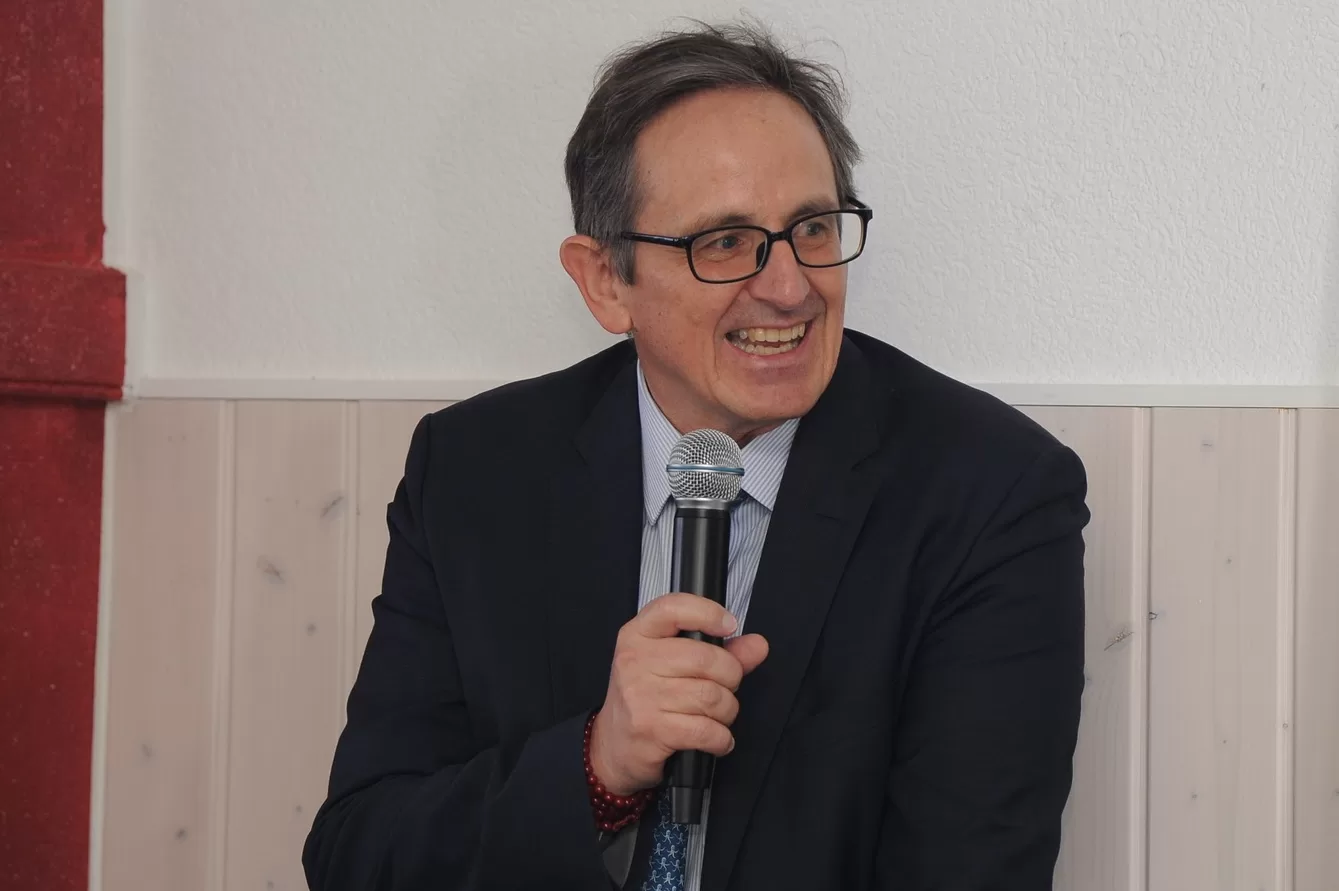
Dr Urs Lustenberger
Thank you very much for the honour of saying a few words to this elect group of people. It’s been a long time since we have been hosts of Pathfinder Group, and we have always enjoyed its hospitality very much. When I heard that Ikram Sehgal is celebrating his 20th anniversary up here, I was trying to figure out when the SACC joined up with him. I think we joined up with him just very shortly after he started to come here.
I remember the legendary breakfasts in the Steigenberger, where he introduced all sorts of prime ministers, senators, politicians, and generals to us over the years, and we always admired his energy, his love for Pakistan and his devotion to the cause. And as we see it today, again, he is the most gracious host. He stays in the background and insists that I say the big welcome, even though he is the host. And I do the big welcome, but the welcome means a thousand words of thanks to Ikram and his devotion to his beautiful country. But he is facing challenges. We all know that Pakistan is facing a lot of challenges, but these challenges have to be overcome because, in itself, Pakistan has all the resources needed. It has the population, and the humanity needed to make it across all these hurdles, and it has the natural resources, the energy, and whatever is needed to make a rich country out of it. And over time, I am convinced Pakistan will be able to cross all the hurdles that must be crossed. To make it one of the most prosperous and future-looking countries. When I see the group companies that Pathfinder has arranged under itself, then I know that Ikram sees the future of Pakistan in electronics, digitalizing, etc. I am always amazed at his entrepreneurship and his spirit. I’m always amazed at his entrepreneurship and his spirit, so with this I would like to hand over the word back, say a thousand thanks and enjoy the lunch.
Haya Sehgal Author, Resilient Pakistan
I’d like to invite Dr Amjad Saqib the chairman of BISP and the founder of Akhuwat foundation, he is our chief guest today and we’re honoured to have him. Dr Amjad Saqib is the chairman of Benazir Income Support Programme (BISP), he originally served in the Civil Service of Pakistan as DMD. Dr Amjad Saqib is the founder of Akhuwat, the largest interest-free microfinance program in the world which has dispersed over Rupees 200 billion to around 6 million poor families in Pakistan and has also launched Pakistan’s first free Akhuwat College University that is open to talented students of impoverished families from all provinces, Gilgit-Baltistan and Azad Kashmir. He is also the recipient of Social Entrepreneur of the Year award for 2018 by the World Economic Forum and Schwab Foundation, he has also has received the Commonwealth 31st Point of Light Award by Queen Elizabeth II in 2018, furthermore the President of Pakistan has bestowed upon him the Sitara-i-Imtiaz in 2011 and the government of Pakistan has recently announced Hilal-i-Imtiaz in 2023. I invite Dr Amjad Saqib to speak to us for a couple of notes on inspiring Pakistan.
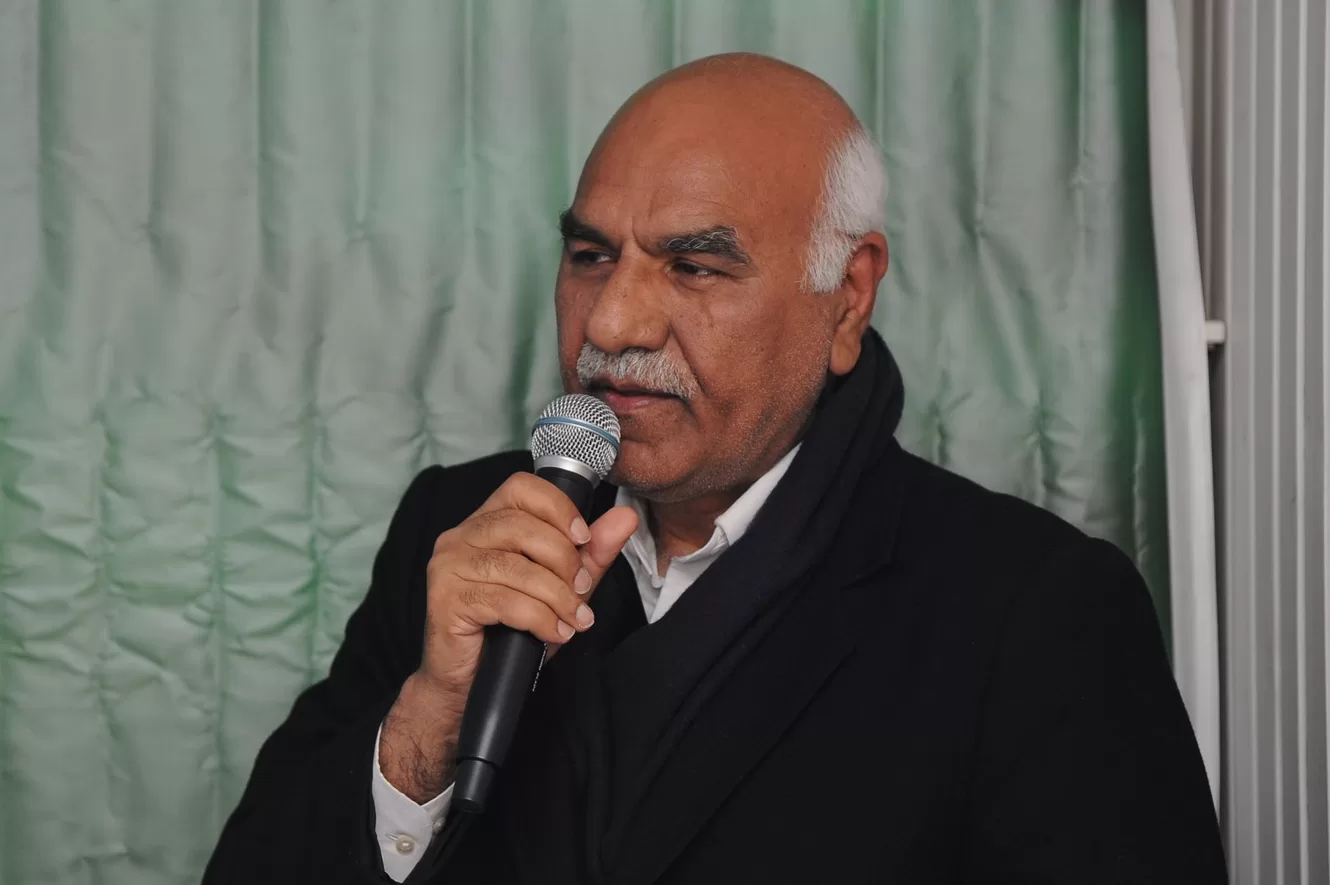
Dr Amjad Saqib Founder, Akhuwat Foundation
Let me first thank the Pathfinder Group and VRG for inviting me and letting me speak at this auspicious event. As the name goes, Pakistan is inspiring, a land of the highest mountain peaks in the world, the home of the Himalayas, Karakoram, and Hindu Kush. With a coastline of thousands of miles of clean, pure, and pristine water, Pakistan is inspiring. With lush green valleys, deserts, a population of 240 million, hardworking, intelligent, and brave people, Pakistan is inspiring. With a history of over 4,000 years, the relics of Harappa and Mohenjo Daro are home to Muslims, Hindus, Christians, Jains, and Sikhs. With its diverse culture and civilization, with more than 20 languages, Pakistan is inspiring. With more than 500 universities, the 7th nuclear power in the world, one of the largest armies to defend its trenches and above all diaspora of 12 million people spread over Europe, America, the Middle East, the Far East, Australia, and Africa. Contributing to the world economy giving the message of, compassion, love, and sharing. Besides, these two words, on history, geography, culture, and the people, I will only be presenting two case studies very briefly, which will tell you, how brave, innovative, creative, and inspiring, people, Pakistan is proud.
The first story is named, the Benazir Income Support Program (BISP), started by the government of Pakistan in 2008. The other story is of Akhuwat Foundation; an institution, which works in partnership with the government and civil society. BISP is a beacon of hope for millions of underprivileged families in Pakistan and a testament to our commitment to social justice. This is the largest social safety net highly acclaimed by the World Bank and international agencies. Its mission is to support disadvantaged households, bring girls and boys to school, and empower women. The program is built upon three fundamental pillars: consumption smoothing, poverty reduction, education, and women empowerment.
I’m happy to see, Mr Tariq Malik, former Chairman of NADRA, from whom we learned and developed a national socio-economic registry – a database that covers socio-economic indicators for over 35 million households. Within the force of the BISP, there is Benazir Kafalat which supports 9.3 million families with quarterly cash grants. Through the Benazir Scholarship Program, we extend educational stipends to more than 8 million students from beneficiary households. As we all know promoting education is the best option. This program ensures that every Pakistani child has equal access to quality education, opening doors to a brighter future and improved livelihood. The Benazir Nashonuma initiative is a critical intervention aimed at addressing malnutrition, benefiting more than a million pregnant mothers and their new-born children. In times of national emergency, this has been the primary vehicle for large-scale cash transfers providing safe and efficient assistance. Its impact during COVID and flood relief in 2022 was so overwhelming. Quite recently we have launched another initiative that is the Hybrid Social Protection Scheme, which aims at providing a saving facility to more than 150,000 families. BISP started in 2008 and from baby steps, it has gone far ahead.
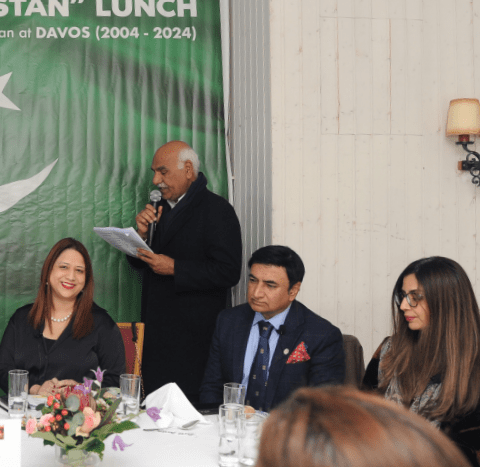
The number of families it supported in the start was nearly 4 lacs to 5 lacs which has exceeded to more than 9.3 million families. This is the best reflection of the care, love, and compassion of our nation.
Another story of compassion, sharing, and giving which is equally amazing and inspiring is the story of the world’s largest interest-free financial inclusion program, ‘Akhuwat.’ It started 22 years ago, with nearly $100, which was given to a poor widow to start her business. With just $100, she purchased two sewing machines and only after six months, with a smiling face she returned that $100, saying, don’t put this money in your pocket, give it to someone else in need. I’m sure this money which is the manifestation of love and care will also make their life easy. So, starting from just $100, today we have been able to Alhamdulillah distribute more than $1000 million US dollars among 4 million families. These 4 million families are 24 million people. They were not beggars and never had they sacrificed their self-respect. They only took loans and for the first time, it was interest-free. You will be amazed to know how great the people of Pakistan are, that the recovery percentage of these non-pledged loans is more than 99.
The people who had more resources came forward, embraced, and helped them but instead of making them beggars offered loans to start businesses and become entrepreneurs. Those underprivileged borrowers took advantage of their entrepreneurial abilities to increase that amount and contributed to the economy of Pakistan, besides coming out of poverty. Encouraged by success, that is how compassionate our society is. How people of Pakistan are willing to share their riches with have-nots, we continued our journey through Akhuwat and were able to establish the first-ever fee-free university for Pakistan. Someone posed a thought-provoking question: if loans can be interest-free, why can’t education be free of charge? Considering parents with bright children but no means to afford university fees, Akhuwat in Pakistan has established a remarkable institution. It allows students to pursue their education first and worry about fees much later, perhaps after 10 or 20 years, thereby continuing the journey of compassion.
Briefly touching on Pakistan’s allure, from the majestic Himalayas, Karakoram, and Hindukush, to its rich 5,000-year history, diverse languages, and vibrant culture. The people of Pakistan are innovative, creative, and compassionate. With its extensive coastline, lush valleys, towering mountains, and sprawling deserts, Pakistan is an exceptional tourist destination. Often, visitors who initially hesitate to come find themselves captivated by its charm and reluctant to leave. I dream of showing foreign guests the true essence of Pakistan – its hospitality, cuisine, and the warm smiles of those in remote villages.

I must express gratitude to Ikram Sehgal Sahab for sharing Pakistan’s inspiring story over the last 20 years. If you will allow me to say a word in Urdu:
تشکیل و تکمیلِ فن میں بھی حفیظ کا حصہ ہے
نصف صدی کا قصہ ہے دو چار برس کی بات نہیں
How brilliantly, diligently, and selflessly Ikram Sehgal has served this country. That’s amazing, it is another dimension of inspiring Pakistan that we have Ikram Sehgal and many other people who love to follow in his footsteps. We have dreams and we know how to actualize these dreams. Our dreams are making this world a happy place to live in. Our dreams are the fight against poverty. We have dreams of taking every girl and boy to school. We have dreams that all families live the same prosperous and happy life which we all desire. Thank you very much Ikram Sahab and thank you very much ladies and gentlemen for listening so patiently.
Haya Sehgal Author, Resilient Pakistan
Thank you so much for those wonderful words, Dr Amjad Saqib. I am now going to introduce our keynote speaker, Mr Arif Anis MBE. Arif Anis MBE is a Wall Street Journal and USA Today bestselling author of British-Pakistani origin, he has inspired millions globally, including world champions and Olympians with his books I’m Possible and Made in Crisis. He is recognized in the UK’s top 100 influential people list for 2023 and his insights have profoundly impacted individuals and institutions worldwide, he was recently awarded the Royal Honours of the MBE by King Charles III and also awarded the Freeman of the City of London. Anis is a global speaker who has addressed the audiences in 84 countries on planning strategy, crisis leadership, and artificial intelligence.

Arif Anis (MBE)
Thank you very much Haya. Pakistan is truly inspiring. Soon, we’ll enjoy an inspirational lunch, courtesy of our host, Ikram Sehgal. As Dr Amjad Saqib rightly pointed out, storytelling is crucial. If we don’t tell our stories, someone else will, shaping narratives that might not capture our accomplishments accurately. We, as Pakistanis, must continue sharing our stories of inspiration. Dr. Saqib shared two stories, and now I’ll present a different perspective as a British Pakistani. Our diaspora is the world’s fourth-largest, with 12 million people across 153 countries, creating incredible and uplifting stories.
Joining you from London, I bring tales of success. Sadiq Khan, the Mayor of London of Pakistani origin, will soon begin his third consecutive term. His journey from a bus driver’s son to becoming the mayor is remarkable. We hope to see him as the UK’s first British Pakistani Prime Minister. In the UK, we have 35 MPs, Lords, and over 500 counsellors of Pakistani origin. Among the UK’s top 10 billionaires, we have British Pakistanis like Sir Anwar Pervez, who rose from being a bus driver to the Sunday Times UK’s top 10 billionaires. This is who we are – Pakistanis with great stories. Here’s a fun fact: the British national dish is Chicken Tikka Masala, a Pakistani dish. This shows our impact globally, leaving our footprints wherever we go. I want to share a personal story that led me to join you today at Davos. In February 2020, amid the COVID-19 pandemic, Time Magazine listed the world’s most crisis-ready countries, placing the United States and the United Kingdom at the top. However, these countries faced a severe crisis in March 2020. I, too, was diagnosed with the virus. During my treatment, I discovered the shortage of Personal Protective Equipment (PPE) for healthcare workers in the UK’s National Health Service. Despite this unexpected challenge, I recovered swiftly. On March 26, 2020, Prime Minister Boris Johnson declared a national emergency and imposed a lockdown, placing us in an unprecedented situation.
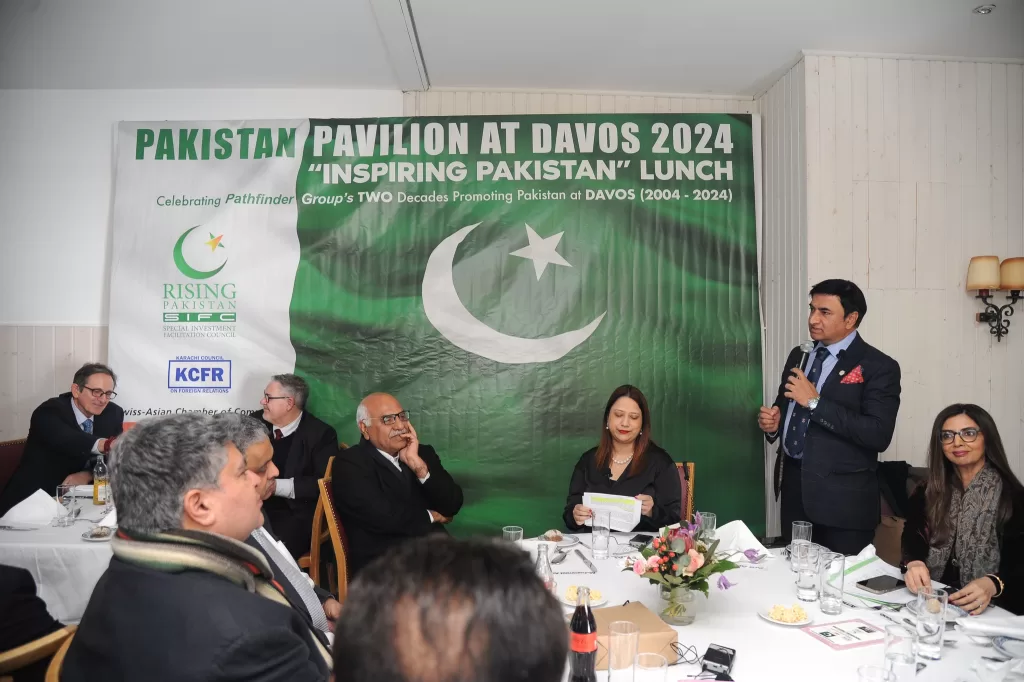
After one week, I came across a news article in the Mirror newspaper featuring a British nurse in distress at a local superstore due to empty shelves and a lack of essential supplies. Restaurants, pubs, and eateries were closed, leaving healthcare professionals with limited options, relying on hospital vending machines for sustenance. Witnessing the challenges faced by frontline workers fighting the pandemic, especially the shortage of food, prompted me to take action. Alongside friends Suleiman Raza and Bilal Sadiq, we initiated the “1 Million Meals” campaign, aiming to provide free, hot meals to doctors, nurses, and paramedics across the UK. Despite not being affluent individuals, we launched the campaign with an initial contribution of £10,000. Within 72 hours, global football icon David Beckham endorsed the cause, catapulting it into international recognition. The campaign expanded rapidly, involving over 1,000 volunteers from diverse backgrounds. Over the next three months, “1 Million Meals” delivered millions of meals to 206 hospitals nationwide. Our efforts garnered royal recognition, with Queen Elizabeth II and Prime Minister Boris Johnson acknowledging the campaign’s impact. Ultimately, we received the Royal Honors of the Member of the Order of the British Empire (MBE), a unique recognition for all three founders, highlighting the exceptional nature of our collective contribution. This endeavour showcased the inherent Pakistani spirit of extending a helping hand in times of crisis.
Haya Sehgal Author, Resilient Pakistan
I would like to introduce to you now Ambassador Aisha Ali. With a diplomatic career spanning over 24 years Ambassador Aisha Ali is presently serving in the Prague Czech Republic since August 2023 as the Consul General. As head of mission Consul General Pakistan, New York USA she was the first female Diplomat to head one of the largest Pakistan diplomatic Consular missions there. In that capacity she served the largest concentration of Pakistani Americans, approximately 300,000 in number in over 11 states of the Northeast. In the US Ambassador Ali successfully spearheaded Emergency Operations for the diaspora during the height of covid-19 including repatriation of stranded citizens to Pakistan on special flights. Ambassador Ali holds a Master’s degree in International Public Policy from SAIS Johns Hopkins University.

Ambassador Aisha Ali
I want to express my gratitude to KCFR, SACC, and especially the Pathfinder Group, led by Mr Ikram Sehgal and Chairman Zarrar Sehgal. It’s an honour to be here as the Ambassador of Pakistan to the Czech Republic, discussing women’s empowerment. Pakistan has a rich history of female diplomats, with notable figures like Rana Liaqat Ali Khan.
Being a female diplomat is challenging, especially for a Pakistani woman breaking stereotypes. The Foreign Service of Pakistan is a merit-based equal-opportunity organization with around 150 women diplomats. The increasing number of women in the Foreign Office signals a promising future. My journey has been rewarding, supported by my parents’ vision and sacrifices. Creating networks for young girls to dream big is crucial.
In my career, I’ve been a Consul General in New York, breaking barriers in what was previously a male domain. While challenges persist, Pakistan has made significant strides in women’s rights with a robust legal framework. We’ve signed and ratified UN Core Treaties and witnessed notable achievements such as BISP.
Despite concerns, positive trends in women’s education and involvement in various sectors are emerging. The use of digital technologies holds the potential for empowering women further. I appreciate the opportunity to share this story, and thanks again to Ikram Sehgal Sahab for the platform.
Haya Sehgal Author, Resilient Pakistan
Thank you, Ambassador Aisha, ladies and gentlemen I’d like to introduce to you Ambassador Rizwan Saeed Sheikh from the Ministry of Foreign Affairs. Ambassador Rizwan Saeed Sheikh is presently serving as additional foreign secretary Middle East SIFC and Economic Diplomacy at the Ministry of Foreign Affairs Islamabad. He is a career Diplomat from Pakistan with three decades of experience, previously Ambassador Sheikh was Pakistan’s first Permanent Representative to OIC as the head of a pioneering act in the country’s diplomatic history. He also served as Deputy Chief of Mission DCM at the Embassy of Pakistan in Washington DC for over four years. Welcome Ambassador Saeed.
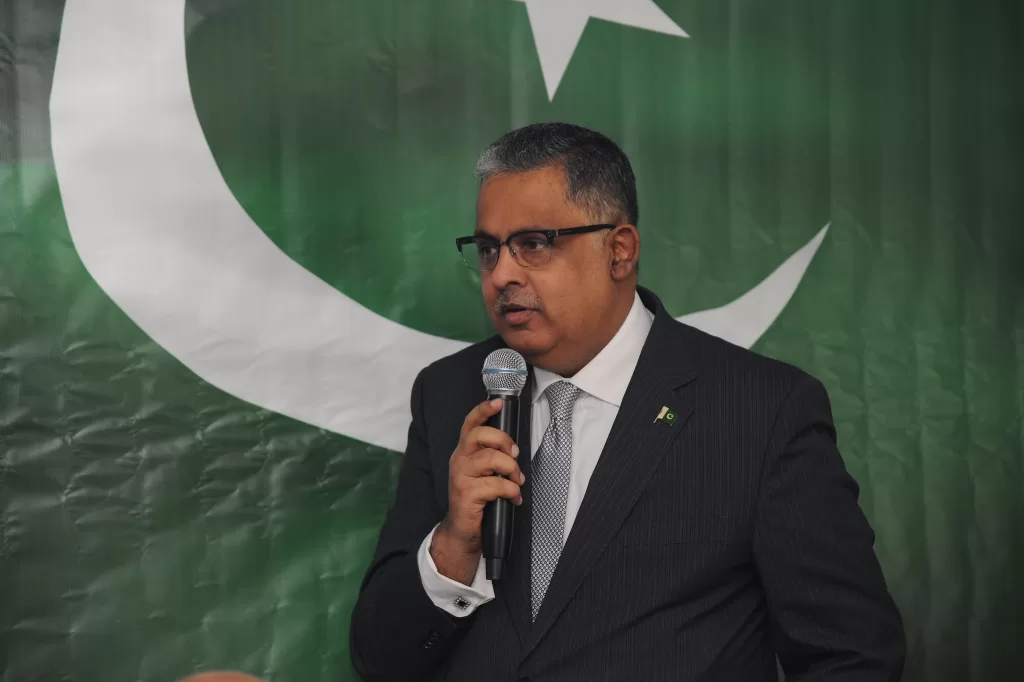
Ambassador Rizwan Saeed Sheikh
Thank you Haya for the introduction and profound gratitude to Sehgal Sahab, the Pathfinder Group and Zarrar Sehgal Sahab who I just met on the train on way to here but have heard a lot about him. I may be the only one in this group who was present at the first Pathfinder event way back. I was posted as First Secretary at Pakistan’s permanent mission to the United Nations in Geneva 20 years ago and I was much slimmer and much younger then. I remember being the Head of the Chancery in those days, who is the administrative head of the mission, and I had to work with the Pathfinder team to organize that first Breakfast. Today, two decades on, we are here celebrating not only two decades of success but 20 years of sustained Pakistan’s Presence at the World Economic Forum is certainly something to celebrate, and I would request to give Sehgal Sahab a big hand for that.
Pakistan has many stories to tell, with a history that extends well before its independence in 1947. Initially having Karachi as its capital, Islamabad now holds that title. Notably, the ancient Soan Valley, near Islamabad, is home to some of the oldest human civilization remains. Despite facing security challenges and a complex neighbourhood, Pakistan prides itself on its deep-rooted history.
The resilience of Pakistan is aptly captured in Madam Haya Sehgal’s book, ‘Resilient Pakistan.’ Positioned in a challenging neighbourhood with countries like Afghanistan, Iran, India, and even China, Pakistan has maintained robust relations, with the Arabian Sea being a constant, peaceful neighbor over the past 77 years.
Pakistan has played a significant role in global affairs, particularly in combating international terrorism, an effort unmatched by other countries. The nation has consistently overcome various crises, including security, economic challenges, and natural disasters, proving its resilience. Pakistani diplomacy, as highlighted by Ambassador Aisha Ali, has been impactful, especially through the efforts of the Foreign Service of Pakistan. The country has managed to punch above its weight in diplomatic matters, drawing inspiration from notable figures like Ambassadors Agha Shahi, Niazi A. Naik, and Munir Akram.
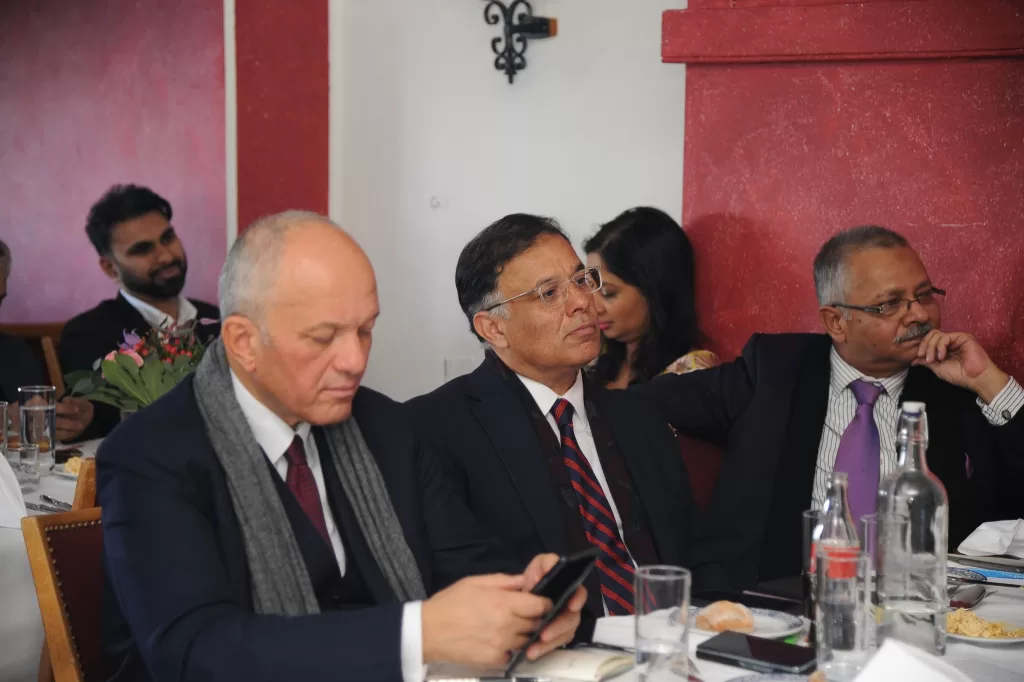
My contribution, particularly during my tenure at the OIC General Secretariat, includes being the first-ever spokesperson for the Muslim world and establishing the OIC’s first Human Rights Commission. Despite initial scepticism and challenges, the Commission has become a reality, reflecting Pakistan’s commitment to human rights. Establishing the OIC’s Human Rights Commission was a daunting task, involving extensive negotiations and collaboration with international bodies like the UN’s Office of the High Commissioner for Human Rights. The support from the then High Commissioner Navanethem Pillay was instrumental in its establishment, especially during the challenging period of the Arab Spring.
In the Foreign Service of Pakistan, we have a history of overcoming challenges, and this spirit continues to inspire us. Despite current economic difficulties, Pakistan remains a country ready for investment. Our focus is now on leveraging our geo-economic significance, as evidenced by the recent establishment of the Special Investment Facilitation Council (SIFC). With the fifth-largest population globally, Pakistan is a significant market, poised to become the largest Muslim nation by 2030. The country is rich in resources, including rare earth metals, and presents vast opportunities for cultivation and food security. As Pakistan stands on the brink of economic takeoff, I invite everyone to recognize and benefit from the potential of Pakistan, a land of great opportunity.
Haya Sehgal Author, Resilient Pakistan
Thank you, Ambassador, I do agree with you, I think Pakistanis no matter what hits them just simply pull through and they stand back up again and again and again. I’m very happy to introduce another woman on this panel, Gulmina Bilal Ahmed, she is the Executive Director of Individualland, she has a rich 24 years of experience in the development sector with a sharp focus on peacebuilding, social resilience, youth engagement communications gender and social inclusion and that is something that I write about.
She has developed a portfolio of national Regional and International Partners recognized as a resource person on PPCS Public Policy and Communication Studies. Since June 2007, she has worked as the Executive Director of Individualland Pakistan. IL which is a Consulting and advocacy group working in South and Southeast Asia relevant to the panel is Gulmina’s interest and experience in strengthening and mainstreaming women in media, law enforcement, Parliament, local government and policy engagement. We welcome you on board.
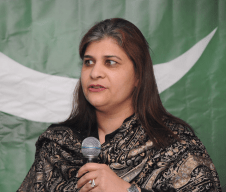
Ms Gulmina Bilal Ahmed Executive Director, Individualland
We’ve been talking about storytelling. I think, on this wonderful afternoon at Davos, we should celebrate and acknowledge the first original Davos Pakistani Storyteller, Mr Ikram Sehgal, and his Pathfinder Group. Let’s be candid; Pakistan’s story is often lost in translation, so Sehgal Sahab has done quite a daunting uphill task of persistently and consistently telling the story and inspiring us, the newer generation of storytellers, to continue in his footsteps.
Ladies and gentlemen, a few years back one of the English monthly Pakistani news magazines, for its International Women’s Day cover had a question on its cover. And the question was, will the real Pakistani woman please stand up? I bring to you this question today. Just like the country is beautifully, gloriously diverse and a little complicated, the Pakistani woman is also not homogeneous, and neither are the circumstances in which she finds herself. We have globally acclaimed names represented as the Pakistani woman, Malala Yousafzai, Benazir Bhutto Shaheed, and Sharmeen Obaid-Chinoy. But the Pakistani woman, even today, is part of a tragically high statistic of a 33% Maternity Mortality Rate.
In discussing storytelling, I’d like to share the story of Samina Sheikh, a young Media Studies graduate from an underdeveloped area near Afghanistan. Despite the challenges of working in a male-dominated media environment in a small city, Samina harnessed the power of digital connectivity to create a social media news platform called ‘Burkha Journalist.’ Along with five other women, she reports from the field while wearing a burkha, turning challenging circumstances into opportunities.
Reflecting on the progress made in gender equality, I recall a time 25 years ago when women were scarcely represented in the Police Service of Pakistan. Today, I train police personnel who are men, women, and transgender individuals. We now have women at every level of law enforcement and specialized women and child police stations and facilitation centers, not only in major cities but also in smaller towns. This progress is the result of collaborative efforts between the public and private sectors to address gender-based violence, especially violence against women.
Despite Pakistan’s low ranking on the Global Gender Index, there’s notable progress in political empowerment. Pakistani women are exemplars of resilience, rebuilding their lives after disasters and conflicts with whatever resources they have.
Moving forward, we need to connect the dots to create a larger, more impactful narrative. Investing more in women entrepreneurs and organizations that support them is crucial. Initiatives like telemedicine in remote areas demonstrate innovative solutions to healthcare access. Investing in female media is also important to change perceptions and highlight stories of empowerment, like Samina’s ‘Burkha Journalist,’ and other women who are making significant contributions to society. However, resilience alone is not enough. We need institutionalized legal frameworks and investments in innovative ideas to further advance progress. So that 20 years later, when we are again celebrating Ikram Sahab’s ideas and the Pathfinder’s resilience, we will have even more beautiful stories to tell. Thank you so much.
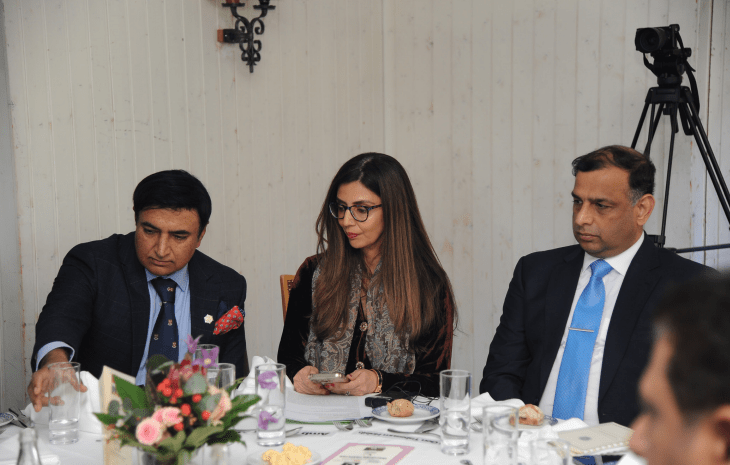
Haya Sehgal Author, Resilient Pakistan
Thank you Gulmina that was really a wonderful speech, thank you for participating. I’m going to introduce you guys today to Sayed Ali Nasir who is the Chief Data and Strategy Officer of Jazz; Ali and for the last two decades steering multi-billion dollar businesses in challenging environments, presently with Pakistan’s largest tech and digital company, Jazz. Ali brings strategic decision making crisis management and government advocacy expertise to the table, he has successfully pivoted his career from strategy and communications to transformational business performance and is now a recognized leader in the commercial and technology arena. Prior to this Jazz Ali spent over a decade in the Tobacco Industry and before that had a decade long career as a civil servant with the Government of Pakistan.
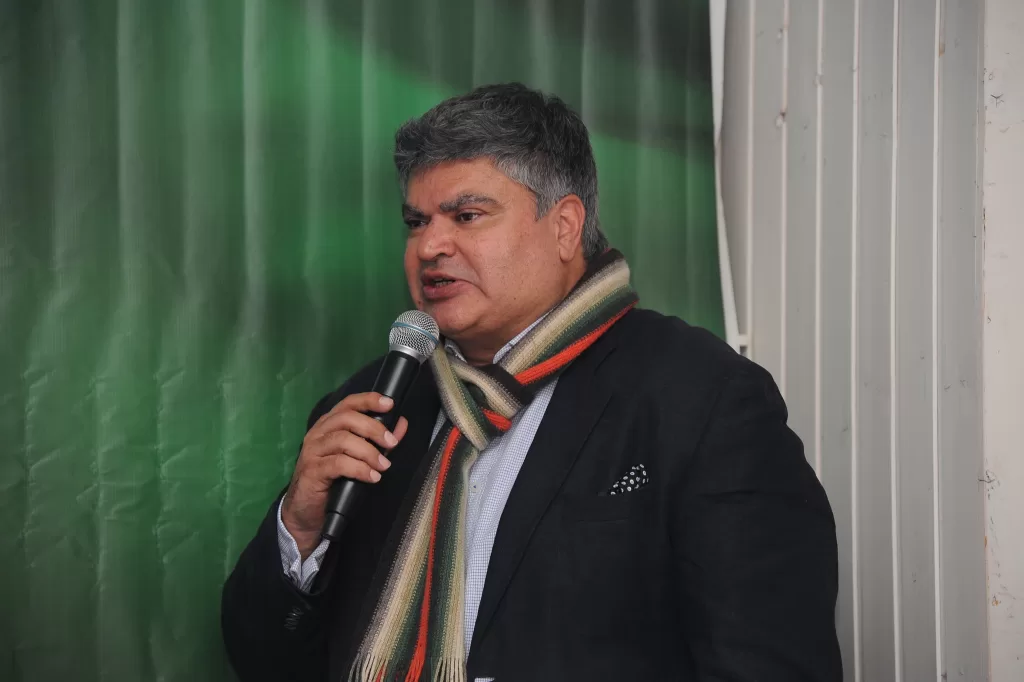
Mr Syed Ali Naseer Chief Data & Strategy Officer, JAZZ
Thank you, Ikram Sahab, for the invitation and for continuing to practice the mission of making sure that Pakistan stays relevant on the world stage. I think the number of inspirational stories that I’ve heard today shames me as a Pakistani that we don’t pay enough attention, and a couple of my colleagues here have mentioned that we need to do a better job of storytelling. My story is not that inspirational, so I’m not going to try and compete, and I think the main course is about to be served, so I don’t want to compete with that either.
For me, I think the important thing here is not so much our resilience, which I think has been born out. Ambassador Sheikh talked about how we’re one of the oldest populations on the planet and we aren’t going anywhere in a hurry. I’m going to talk about opportunity because I think it’s often been said, and we have this joke about the Pakistan Cricket Team that never performs to its potential, that they have a lot of potential, but unfortunately, that potential never gets realized. But honestly, I think that is about to change, and the reason I believe that is about to change is because of the industry that I’m in.
Jazz is the largest connectivity and digital player in the country, and what we see today may not be visible to a lot of you and a lot of people globally. We all know Pakistan is the fifth-largest country in the world with a population of about 240 odd million. What we don’t know is that we have the fourth-largest number of freelancers in the world. So, the reason is that 64% of our population is what we call digitally native. They have been born and grown up in an environment where digitalization comes to them naturally. The digital savviness of future Pakistan is a game-changer, and it’s borne out by the industry that we see. We have the 10th largest number of internet users, and that’s not a statistic we’re proud of because we have the fifth-largest population, so why are we 10th on the internet? That is due to some structural issues that we’re in the process of resolving.
But honestly, from the perspective that I get personally as the Chief Data and Strategy Officer at Jazz, is the amount of data that is being generated and used by the youth of Pakistan to drive in areas that we’ve talked about. Ambassador Aisha and Gulmina talked about the change, the set change that digitalization is making, and I have an opinion where I believe this is a game-changer for Pakistan because previous attempts for Pakistan to realize its vast geographic as well as people potential have been held back by a resource constraint. I think the fourth Industrial Revolution with not a great emphasis or reliance on resources is a game-changer. If you have the right ideas, you have a computer, and you have an internet connection, the world is at your doorstep. And I believe for that reason, Pakistan is about to finally realize its potential.

We’ve seen Pakistanis do well, as Sir Anis talked about the diaspora; we’ve seen how they are now starting to come back and invest in Pakistan and bring a bit of global expertise to that enthusiasm and spirit that we know and recognize exists in the country. So, we at Jazz are very excited because we believe that we’ve got front seats to this transition, and we have a role to play. It’s a responsibility that we’re taking very seriously, and we are encouraging a lot of people in the country and outside to talk about Digital Pakistan more so than inspiring Pakistan. Because we believe that is the route Pakistan can take to become a truly inspirational story out there.
Thank you again, Sehgal Sahab, and honestly, the panel that you’ve chosen highlights some of the very various facets, the distinct facets of Pakistan. My congratulations again to KCFR and the Swiss Asian Chamber of Commerce for hosting us.
Haya Sehgal Author, Resilient Pakistan
World Bank is advising countries on digital ID and implementing digital public infrastructure to achieve development goals. Now, I would like to introduce Dr Tariq Malik, he is the former chairman of the National Database and Registration Authority, called Nadra Pakistan, where he implemented a digital transformation plan by rolling out 45 digital public goods and services in two years. Before joining Nadra he was advising member states of the UN on digital governance as Chief Technical Advisor of UNDP, he was one of the key architects of the Benazir Income Support Program (BISP). Dr Tariq not only advocates but shows how the use of digital ID and Innovative Technologies can transform social protection, Financial Inclusion programs to empower women to protect internally displaced persons, combat tax evasion and corruption, strengthen democracy, and reduce poverty in Pakistan.
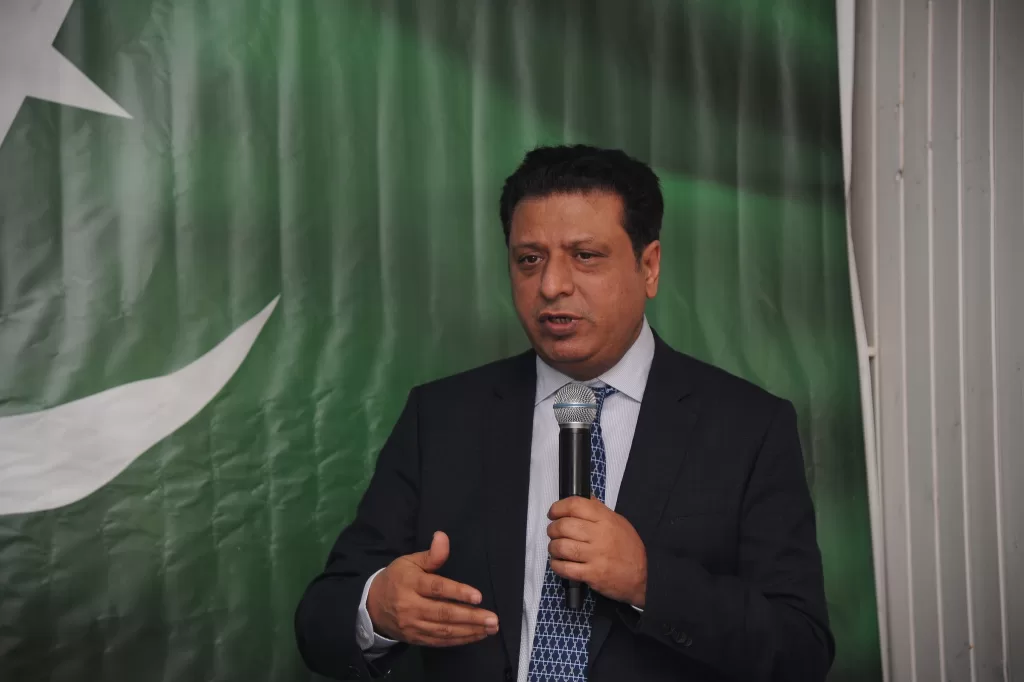
Dr Tariq Malik
I have always believed that the real strength of inspiration lies in the people of the country, and one of the persons that I want to acknowledge is Ikram Sehgal Sahab. I want to congratulate the Sehgal family for taking Pakistan on the international stage, introducing it, and inspiring the story by narrating the story of Pakistan to the rest of the world.
While we are talking about Pakistan, I’m not going to cover the details that everybody has already mentioned. I come from a very patriotic family. My father is the writer of about 30 books, and he spent a lot of his life educating in Western and European universities, and that’s how we started travelling with him. My second Master’s Degree was from the University at Heidelberg, which is just closer to this place.
When we were growing up, there was a wall of pictures of the family. Everybody had brothers, sisters, and ancestors, but we had two pictures only, and our friends used to joke about how these guys were related to us. One was the great poet and philosopher Dr Allama Iqbal, and the other one was the founding father of Pakistan, Quaid e Azam Muhammad Ali Jinnah.
While we are talking about inspiring Pakistan, and talking about the people who have inspired Pakistan, we need to go back to the roots and talk about how Pakistan’s ideology has inspired the world. Is there any country that was formed after a plebiscite or a vote? Pakistan was. Is there any country that was advocated by a top-notch lawyer like Muhammad Ali Jinnah? Pakistan was not formed by winning a war or somebody discovering land. It was the resilience of the people that made it happen.
So, the ideology that we don’t believe in the caste system, there are no Brahmans, there are no Shudras. The world is talking about inclusivity now in 2023; we were talking about inclusivity when we were making Pakistan. That is the story of Pakistan we were talking about, about equity, about social justice. This is the story of Pakistan and that is so close to my heart wherever I have gone. I have worked in the United Nations and World Bank and I have helped countries. Last month, I worked with the Zambian President, Tanzanian Cabinet, Zimbabwe, and Malawi, from the platform of the World Bank, and I am narrating this story to everybody that this is what Pakistan is. If you like me, if you are inspired by me, then it is the story of Pakistan. That is the inspiration that brings me back to Pakistan always after some time. When there is an opportunity for me, I go back and serve my country.
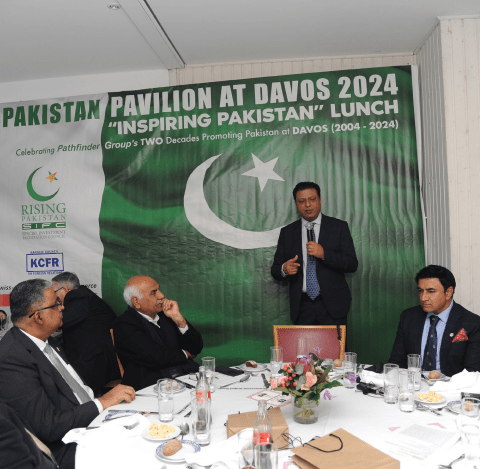
Now a little bit about my life story. While having lunch with Benazir Bhutto at Amarant on 45th Street, we discussed the translation of political vision into digital vision. She expressed her desire to launch a Basic Income Support Program for impoverished women, but Pakistan lacked a poverty database. Despite being away from Pakistan since 1996, I was intrigued and joined her as an Election Observer. After her tragic assassination, I returned to Michigan, but Bhutto’s vision stayed with me.
I seized an opportunity to contribute to Pakistan by accepting a job with NADRA as the DG. At that time, only 40% of the population was registered. We faced challenges, including resistance from the U.S. regarding biometric registration, but we insisted on creating a non-criminal citizen database. Pakistan was the first country to introduce biometric registration. This led to the creation of the Benazir Income Support Program, transforming the concept from a napkin sketch to one of the world’s largest programs.
Facing financial constraints, NADRA had only two months of salary and we were offered a potential loan from the State Bank of Pakistan. However, we declined the loan, choosing instead to self-fund through NADRA’s expansion. we carved out a plan and opened National Nadra Technologies Limited (NTL). We openly participated in a competitive bidding process and we won Nigeria’s identity management system; we won Kenya’s passport system, Sudan’s identity management system, Bangladesh driver’s license, and so on. So, when you get these projects in millions of dollars they translate into rupees making NADRA Pakistan’s most profitable organization.
In 2014, when Ban Ki-moon was the UN Secretary-General, I shared my story at the Brookings Institution. I questioned the World Bank and the United Nations’ approach to reducing poverty and increasing prosperity, emphasizing the need to identify the poor accurately: “How can you reduce poverty if you haven’t counted the poor? If you don’t count them, they won’t count on you or any state. It’s as simple as that.”
I was tasked with estimating the number of people worldwide without an ID. We discovered that 1.5 billion people lacked identification. As the Chief Technical Advisor of UNDP, I was responsible for 134 countries. I was asked to select and establish a structure in five regions, choosing one country from each to replicate Pakistan’s NADRA model. Over five years, I established NADRA systems in countries like Jordan, Peru, and Malawi, linking them with social protection and financial inclusion.
This inclusivity debate was a lesson learned from Pakistan. When I returned as Chairman, Ikram Sehgal Sahab proposed the Assan Mobile Account Program for financial inclusion. Though initially unsure of its implementation, I embraced the idea. We launched a competition among banks and worked tirelessly with the State Bank of Pakistan to implement the program. In two years, we facilitated 10 million accounts, over 40% of which belonged to impoverished women, among other successful initiatives.
The last two projects I spearheaded, a digital census and a digitized voter list impacted every Pakistani. Our advancements even inspired India to digitize its Aadhar system. We challenged biometric companies like Moro Visage and Fujitsu, improving their software with our expertise. These achievements demonstrate Pakistan’s leadership in technology and innovation.
I conclude by echoing Quaid-e-Azam’s sentiment that no power on Earth can undo Pakistan. Our resilience through crises and disasters strengthens us. We learn from our mistakes and continuously improve. With this hope, Pakistan will prosper, and we’ll share our untold stories with the world, learning from others and teaching them in return.
Haya Sehgal Author, Resilient Pakistan
I now very humbly and respectfully invite Major General Tabassum Habib as the DG SIFC. He has been serving in the Pakistan Army since October 1991, he is a graduate of the Command and Staff College, National Defense University Islamabad and King’s College London, he is also an alumnus of the Kennedy School Harvard University in the USA. The General Officer has varied experience and served on various Command Staff and Instructional Portfolios during his illustrious career spanning over 32 years owing to his background and work in economic-related endeavours. He was entrusted with the responsibility to conceptualize and operationalize the Special Investment Facilitation Council, the organization, which was launched on 19th June 2023 and the General, being its First Director General is spearheading it successfully.
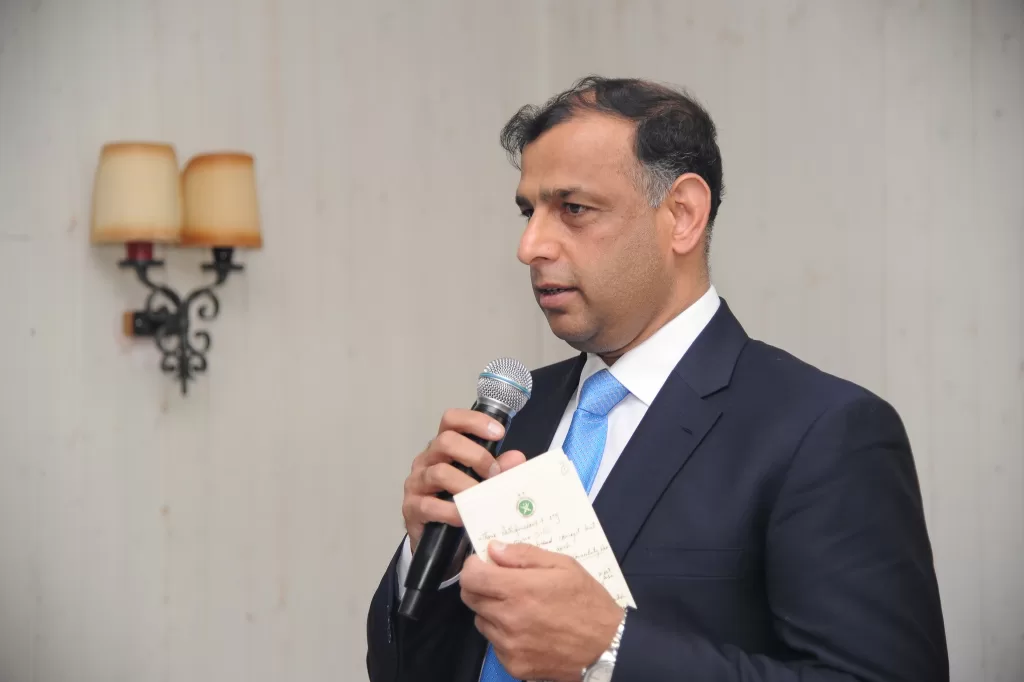
Maj Gen Tabasum Habib DG, SIFC
First of all, my profound gratitude to the hosts, the organizers, the Pathfinder Group, and especially Ikram Sehgal Sahab for affording me this opportunity to address such an august gathering this afternoon. I am the last speaker of the panel, and I would like to request not to draw a parallel with a mushaira. It is just a coincidence that I’m the last speaker because I arrived late due to traffic.
Secondly, all the illustrious members of the panel have been expressing their intent to tell the story of Pakistan, the story of inspiring Pakistan. I find myself in an awkward position because ever since I joined the military, 36 years ago, we have always been told not to tell stories but to focus on doing work. So, it’s very difficult for me to tell a story, and if I fall short of expectations, my apologies for that.
I am the Director-General of the Special Investment Facilitation Council (SIFC), this is the flagship initiative of the government and a special initiative for the economic revival of the country. It is very unique in its composition, having both civilian and military representatives sitting at the table, trying to attract investment, improve the business environment, ease of doing business in Pakistan, and navigate privatization—an intricate issue—thereby contributing to the economic revival of the country. Tomorrow afternoon, I have a very detailed briefing on the functioning and concept of SIFC, so I’ll stop here regarding this aspect and switch over to the topic assigned to me for today, which is “Pakistan as a Connecting Hub.”
When we talk about a country as a connecting hub, this notion of connection is broad, and different interpretations could be taken, such as geopolitical connections, economic connections, societal connections, and so forth. However, as the Director-General of SIFC, I will take a direct and simple approach i.e. the physical connectivity of Pakistan with the regions adjoining towards the east, north, west, and south.
The territory that now constitutes Pakistan has been a connecting hub for centuries, whether it was the East-West trade, access to Western China in ancient times, or the notion of access to warm waters. Pakistan has always held significance in all these notions or efforts of connectivity. In a more recent context, Pakistan is, once again, a connecting state, and nobody can deny its significance. Pakistan is the only state with the capacity to make China a two-ocean state; no other country can achieve this. Aspiring, growing economies to our east, if they want to optimize their terrestrial economic reach westwards to Central Asia and Western Asia, rely on connectivity through Pakistan.
It’s only possible if it goes through Pakistan, Afghanistan, and the Central Asian republics. They’re profoundly dependent on trade and connectivity through Pakistan, and above all, the hydrocarbon reserves of the Central Asian states find the most profitable and business-sensible route through Pakistan. So, Pakistan has immense potential and a significant role as a connecting hub in the region both intra- and inter-region. When we realize this, it’s easy to say but difficult to realize.
Let’s start from the East. Unfortunately, due to factors well known to all of us, optimizing trade opportunities from east to west is not easy. There are complications and impediments. If we talk about connectivity from north to south, although it presents a huge opportunity, it has its geopolitical challenges. Connectivity to Central Asian Republics, Afghanistan, and beyond has been forestalled due to the uncertain/unstable situation in Afghanistan for the last four decades. Toward the West, trade with Iran faces challenges such as the state’s isolation and issues related to financial transactions. Despite these challenges, efforts are being made to capitalize on connecting opportunities in Pakistan.
Since SIFC came into being about 7 months ago, optimizing connectivity and trade has been one of its principal efforts. Firstly, road connectivity; the road connectivity between Pakistan and China has been upgraded, allowing trade to continue for 12 months, overcoming previous limitations due to snow and climatic conditions. Efforts are being made to establish road connectivity to Central Asian Republics through China, bypassing the security challenges in Afghanistan. Despite challenges, road trade through Afghanistan is not discarded as an idea, and efforts are ongoing to ensure Pakistan’s road connectivity to Central Asian Republics through Afghanistan.

Regarding trade through Iran, Pakistan’s Transports Internationaux Routiers (TIR) operations to Tehran and Istanbul are ongoing, and soon road-based TIR operations will access major European capitals. Despite challenges, efforts are being made to facilitate road trade through Afghanistan, leveraging Pakistan’s influences to ensure connectivity to Central Asian Republics.
It is essential to mention CPEC in a discussion of connectivity with regional countries. The first phase of CPEC focused on energy, rails, roads, and infrastructure. Although domestic road infrastructure may not be ideal, it has significantly improved in recent years, opening up opportunities for connectivity beyond Pakistan. Moving to railways, progress has been made on the trans-Afghan railway connecting Uzbekistan, Afghanistan, and Pakistan, with signed agreements and initial feasibility studies completed. Challenges related to the route alignment within Pakistan have been addressed over the years.
There were certain challenges when this came through Torkham and now the alignment of that route will be through Khalachi. Very soon, Insha Allah, this rail connectivity from Karachi to Afghanistan and further to Uzbekistan will become a reality. Also, the upgradation of the infrastructure of the Islamabad-Tehran-Istanbul (ITI) route is under progress, and Insha Allah, Pakistan’s rail-based trade to Istanbul will start very soon.
In addition to that, there’s a unique new idea, which I would say, at this point, will take some time and more work to convert into a project. Now, a new connectivity initiative from Afghanistan through Brahamca will connect Gwadar straight away, bypassing the ML1. This will be a huge opportunity and most of the Central Asian states such as Turkistan and Uzbekistan, are very excited about it. This will reduce the length of the road connectivity by about 800 km and it will be a game-changer. Also, the international connectivity that we are looking for in Gwadar will become a major benchmark. Domestically speaking, the ML1 project has been approved; it is slightly reconfigured with an investment of about 6.8 billion. This domestic improvement of rail infrastructure coupled with connections to regional countries will significantly enhance our trade opportunities with neighbouring countries.
Now, I want to talk about ports. Somehow, in Pakistan as a nation, we are land animals, and the importance of the maritime sector unfortunately has not been realized in Pakistan. A major initiative has been taken from the platform of SIFC, and three ports—Karachi Port, Port Qasim, and Gwadar—have at least half a dozen projects initiated at different stages of maturity. For example, starting with the Karachi Port, the inland connectivity (by rail and road) of Karachi Port is a major issue. A major investment is coming, Insha Allah soon, within weeks, you will hear some very important and good news about the Pakistan ports.
The berths and infrastructure at the port and the freight handling capacity are undergoing major investments, and global investors are getting involved. The Pipi Corridor, something we’ve been hearing about for decades, will see a major agreement signed by Pakistan with some of the biggest global investors. This complete road connectivity through the Pipi Corridor, the development of the Pipi Railway yard, and inland connectivity will revolutionize the port connectivity of Pakistan.
Moving to Port Qasim, the principal import of Pakistan, LNG, is now scattered all over, and all the LNG hubs are being installed at Port Qasim. It will become a major conduit for the hydrocarbon import of Pakistan. Efforts are being made to optimize Port Qasim, with a major investment coming from Dubai port, improving the channel width, depth, and overall safety.
Gwadar is being linked with the railway, both connecting it with ML1 and also going straight towards Afghanistan and beyond to Central Asian countries. The IP pipeline connectivity to Gwadar will start very soon, and several projects for the operationalization of Gwadar Port are underway.
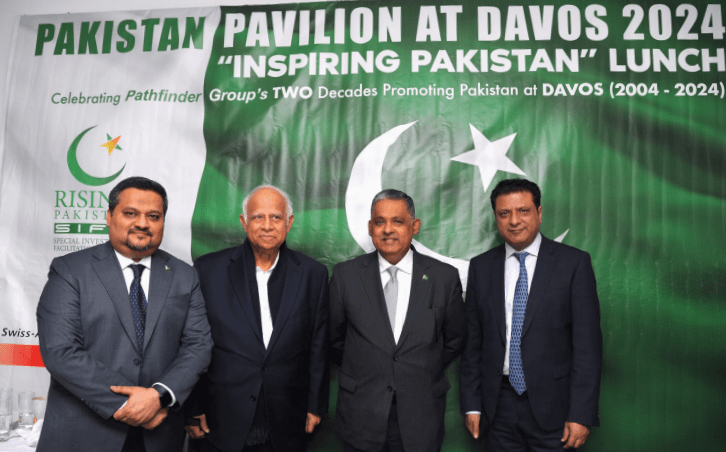
The pipeline, the IP pipeline, and connectivity to Gwadar will start very soon. In the next four weeks, numerous projects for the operationalization of Gwadar Port will be initiated. Unfortunately, Gwadar Port has lagged behind schedule, but efforts are being made to bring it back on track.
There is a huge potential for pipelines in Pakistan, especially, concerning energy connectivity. Some major projects are being fast-tracked on the SIFC platform. The TAPI project, which I wrote an essay about 25 years ago, has made significant progress in the last 8 to 9 months. The framework agreement and implementation agreement have been signed, and the host government agreement is being signed within the next 10 to 15 days. Progress has been made and the last impediment is certain details about its financing. The hope is that TAPI will become a reality soon.
An innovative addition to the TAPI project is that some Middle Eastern countries have lined up investments to take TAPI to Gwadar. The moment it enters Pakistan through Balochistan, one leg will come towards Multan, and the second leg will go towards Gwadar. Turkistan is very excited about it, as this will become a major outlet for Turkmenistan gas to the Arabian Sea and beyond.
It has its challenges. Previously it used to be IPI (Iran-Pakistan-India), and now it is IP. For the last 9 years, it could not make headway because of Iranian factors and some of the considerations that I highlighted. Within the next 3 months, the construction of IP will start, inshallah. Financing has been lined up, the decision has been taken, and it’s only some details of the last leg that are being worked out.
These are some of the connectivity initiatives that I wanted to share with the audience. While we face all the problems, Pakistan has a lot of economic challenges, but all-out efforts are being made to make the best use of the connectivity opportunities that Pakistan has.
In concluding my discussion today about the SIFC, I’d like to acknowledge the significant efforts that have been made. Initially, when we launched the SIFC, we expected that simply lining up projects would lead to a steady flow of investment. This was a new experience for me, as I had no prior background in this area. However, we soon realized that investment doesn’t work like that. Positive feedback from existing investors in Pakistan is crucial. Without their endorsement, attracting new investors to Pakistan is challenging. Therefore, our primary objective shifted to make existing investments successful in Pakistan. When we got into the details, we realized how complicated it is to invest in Pakistan, establish a manufacturing unit and to open up a business. It is hugely complicated. We often lump everything together by saying that security concerns impede investment in Pakistan. My very honest opinion is that it is not the security concerns that impede investment; it is the lack of an investment-friendly environment that has impeded investment and that needs to be addressed.
Businessmen who want to come and invest in Pakistan need a businessman talking to them, not just a bureaucrat. To be honest, they cannot communicate. The very nature of bureaucracy is that it cannot facilitate investment. Therefore, the primary factor or consideration that we now prioritize in Pakistan is to give that opportunity to businessmen and enable them to come and invest in Pakistan. They do not want tax exemptions; they do not want us to provide land or cheap energy. They are ready to pay for everything, but they want the government machinery to enable and assist them in establishing a business. That’s what we are now trying to do at SIFC.
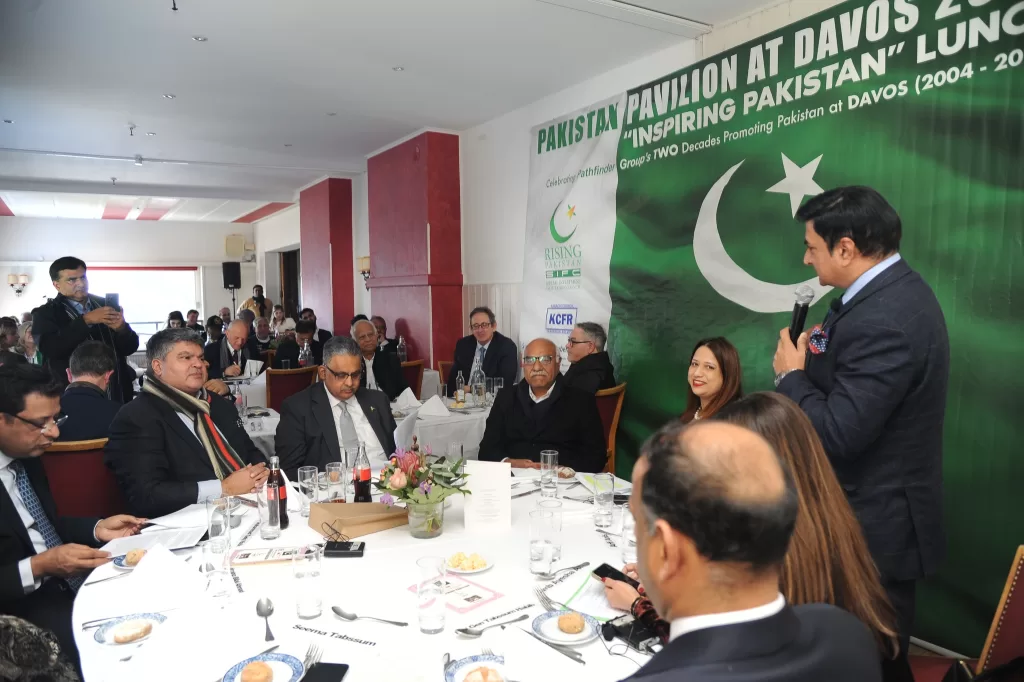
While I said that I cannot tell stories, let me try and craft a story—inspiring Pakistan. When you get into the details of the economy of Pakistan, the opportunities are immense. The kind of market that Pakistan provides is not available in many countries. The people who have done successful businesses in Pakistan, the kind of profit margins they have had, it’s unthinkable in some of the developed countries of the world.
As the Director-General of SIFC, I take this opportunity to assure everybody to come and get in touch with us if you want to do business in Pakistan. I assure you that we’ll give you a new experience. You’ll find somebody within the government bureaucracy whom you don’t have to push; they will push you to fast-track your decisions. We assure you that we’ll undo some of the bad experiences that some investors had in the past. Thank you very much.
Haya Sehgal Author, Resilient Pakistan
To my audience here, thank you so much for being so patient with all of us sitting from the startup to the setting up to the luncheon to listening to all our speakers, thank you for being here with us today. I’m almost done for the day so you guys will be pretty relieved about that I’m going to call the Co-Chairman of the Pathfinder group to give his concluding remarks. Before that, I just want to say hello to a few friendly faces, Aijaz from the CEO Club over here today, thank you for your support, thank you to EES Manuel who was the former deputy head of mission from the French Embassy on the French mission to Pakistan and we have him here today as well, thank you for coming.
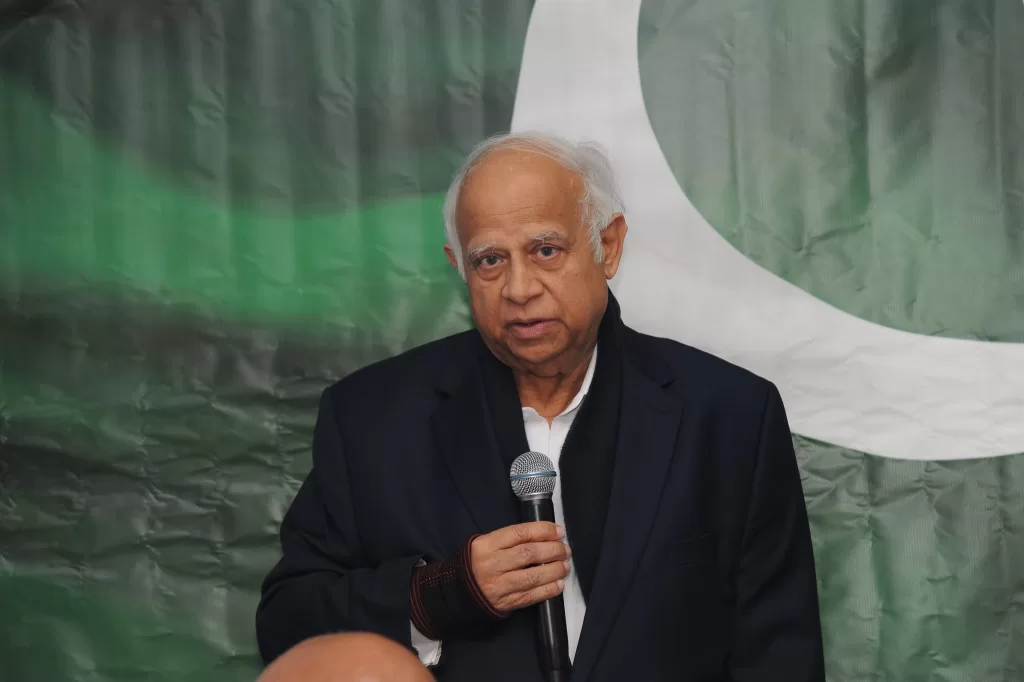
Ikram Sehgal
First of all, I would like to thank Haya for having done a good job in really conducting a very inspiring Pakistan lunch. Having said that, I want to congratulate every speaker here. Just before he left, Michelle mentioned that we’ve heard a lot of panels speaking, and this is one of the best panels that we’ve heard. That is a tremendous accolade for every one of you.
I would like to go back a little bit to how the name “Pathfinder” came about. I was with General Musharraf as an SSG major commanding the Pathfinder team. I was a helicopter pilot, and we used to go and lay out the Drop Zone. The Pathfinder team used to go, lay the Drop Zone and the paratroops used to land. One particular day, during a specific night operation, he usually sat right behind me in the Alouette III helicopter, which barely had room for a helmet. He would tap me on the shoulder when he was ready to depart. However, one day I accidentally left him behind. Suddenly, everyone started hitting me on the head from behind, and that’s when I realized I had forgotten the head of the Pathfinder team. He was left standing there, just like this.
I’ve shared this story for a reason. The other day, somebody came and told me about the Supreme Court saying that he should face a death sentence. A man is dead – the Chief of Army Staff of the Pakistan Army should not be treated in this manner. I have said on television, “No, it’s not acceptable,” and I’ll tell you why. There were two people in the run for the Chief Army Staff slot, both of them were very good friends of mine, and one of them is still my best friend, General Ali Kuli. When Ali lost out, the first thing he said was, “He is the Chief of Army Staff, all debate stops.” He stopped people from discussion by saying, “All debate stops right there.” That is the nature of the game and that is why, you know, when I first went to him, and I wanted to say this because Ambassador Sheik talked about it when I first went to him and said, “Sir, I want to take you to Davos,” he said, “You know, I said, come with me. It’ll make a difference.” I was also not very sure. We went, and at the first breakfast, there were places for 150 people, but 250 people turned up. You could see the energy, and I tell you today, two people committed $100 million on the spot—Bill Gates for health and Jeff Bezos for education. A part of the money was never utilized because of what General Tabassum has talked about, bureaucratic hurdles. Just think, how do we take it? What happens? This, that, and the other.
I might not claim it, but I went to General Musharraf at that time, and I told him, “You have to set up something that will cut through bureaucracy; otherwise, you’ll never get investment.” He was almost on the verge of doing it, but by this time, democracy had come in, Shaukat Aziz took over, and we never had this thing.
Therefore, when SIFC came in, I was skeptical about it, I must be honest, but when I left the Army, I thought LC (letter of credit) was a girl. I said, “What does an Army officer know about it?” So, my point was that I sent two people to SIFC, one of them is here, Brigadier Kiyani, and the other one, Colonel Adnan, both actually from General Raheel Sharif’s course. I sent them and said, “I want to take SIFC to Davos. I have no projects. I had some projects, and one of the architects of that project is sitting right here, Michele Molinari. We’re talking about Karachi to Gwadar. He brought Karachi to Gwadar and Taftan project eight years ago. But we never got anywhere. We never got anywhere because the then railway minister sent his own man to him to ask, ‘What are you doing? Come along.’ The thing, of course, was the man’s integrity, he threw him out of the office. But the point is, we never got through anywhere, and it’s not going to get through anywhere until SIFC comes in and takes those barriers away. In practice, you have to do that. You have to make sure, and there is no limit, because, you’re talking about distinct railway lines. The American West opened up because of the railway lines. So, it is an opportunity of a lifetime. I wish you all the luck and I’m very glad about it.
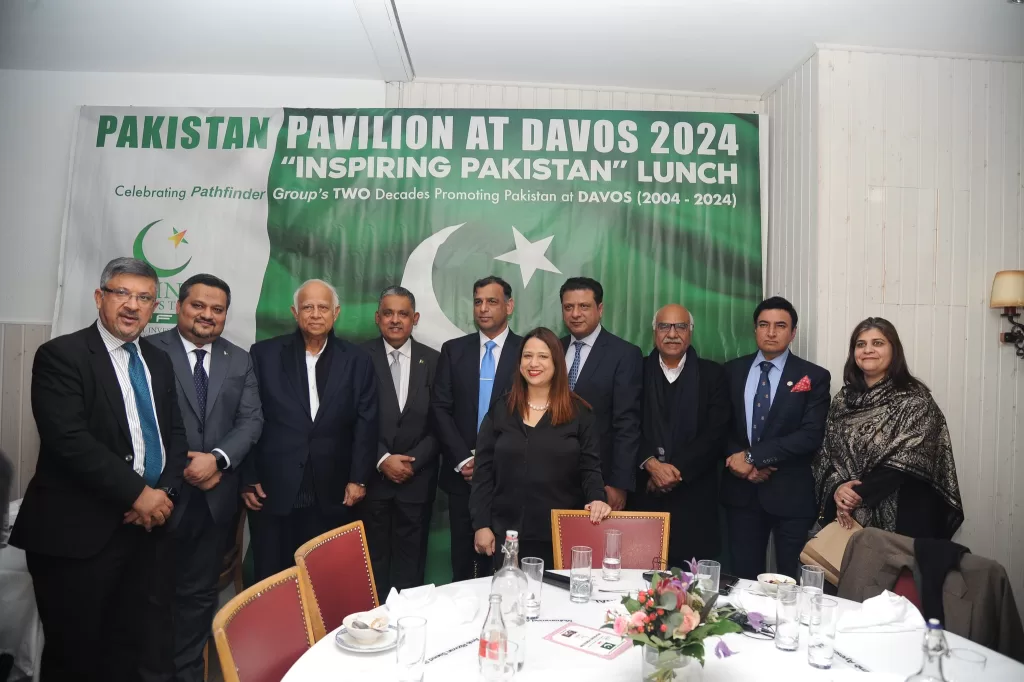
One of my best friends, Yaqub Masood, went to the Royal Military College of Sandhurst. And I was on my way to Sandhurst when I was sidelined. I said, “No, let him have the Sword of Honor here.” So, I didn’t go there. I didn’t get the Sword of Honor either, but that’s beside the point. But the proudest moment for me was by accident, and I would refer to the accident because several people have talked about Quaid-e-Azam. I have brought a couple of people with me, Qawali singers, but I coached them on one thing. I said the first time when my Company, my term was passing out, I was not the Battalion Commander, the commander had a sore throat. So, I was giving the command. As the right forward Company Commander of Khyber Rifles, I was giving the commands. My proudest moment was saying, “First Pakistan Battalion, Quaid-e-Azam Zone, by the centre, quick march.” Right, there, for me, was the proudest moment. And for the first time in the history of the Pakistan Army, “Allahu Akbar” was played. So, hopefully, tomorrow, Morosani will not throw us out of the hotel, but we’re going to have at least that. People talk about “Allahu Akbar.” That is what inspires us.
I’m grateful to everybody here. My son is sitting at the back. You know, he’s the Chairman of the company. I take a lot of liberties with him as the co-chairman, but he is patient with me. And, of course, I must commend my wife because she keeps on giving me cautionary steps at each stage, and tells me, “No, this is wrong.” She comes up with very constructive suggestions which have helped. Along with the result that today in the Davos community, perhaps she’s better known than me. Right, because, you know, you had at one time, I can’t even go into details, but we had a lot of people who were friendlier with her, like they are with my daughter-in-law, Kashmala, today.
I must not forget my other daughter, Nefer, it was her idea to start the Asaan Mobile Account (AMA). She asked me, “Why don’t our guards have bank accounts? Why don’t their wives have bank accounts? Let’s do something like that.” About Nefer, once the DG Rangers in Karachi Major General then, later Lieutenant General, Aizaz Chaudhry, rang me up and said, “Sir, I am sending your daughter under guard back to you.” She was working for The Express Tribune at that time. I said, “Under guard? What has she done?” He said, “Sir, she was taking photographs. Rangers were fighting with the MQM, a full-fledged battle was going on, about 30, 40 people. And she decided that the best place to take the photograph from was right in the middle.” So, she was in the middle, with her team, taking photographs on both sides. He says, “I’m sending her under guard back to you.” So, that’s Nefer!
In the end, I would like to thank all the speakers, thank you for coming. Tariq, who contributed to our success. I must say that the AMA scheme would not have been possible without Amir Ibrahim and Ali Nasir. They went against the entire Telecom industry. They just went against that and said, “We are going to lose money on this.” But the fact of the matter remains, if you believe in financial inclusion, if you believe in women empowerment, we will do this. So, thank you, everybody, we are having our 20th breakfast. We have been in Davos for 30 years, 31 actually because one year I came here not as a member. Thirty years, but 20th breakfast. And we have other engagements tomorrow, and I hope they are as successful as today. And all of you will participate in some way or the other. Thank you all very much.




